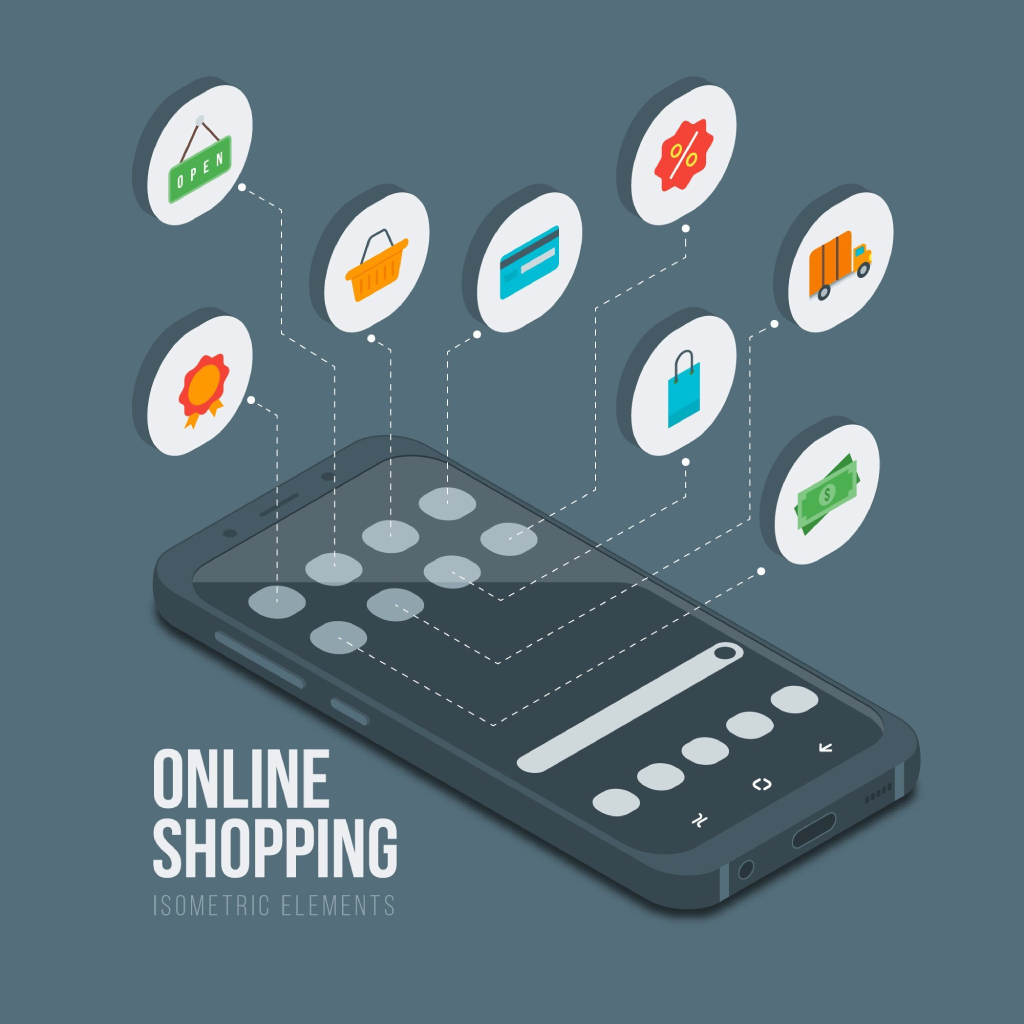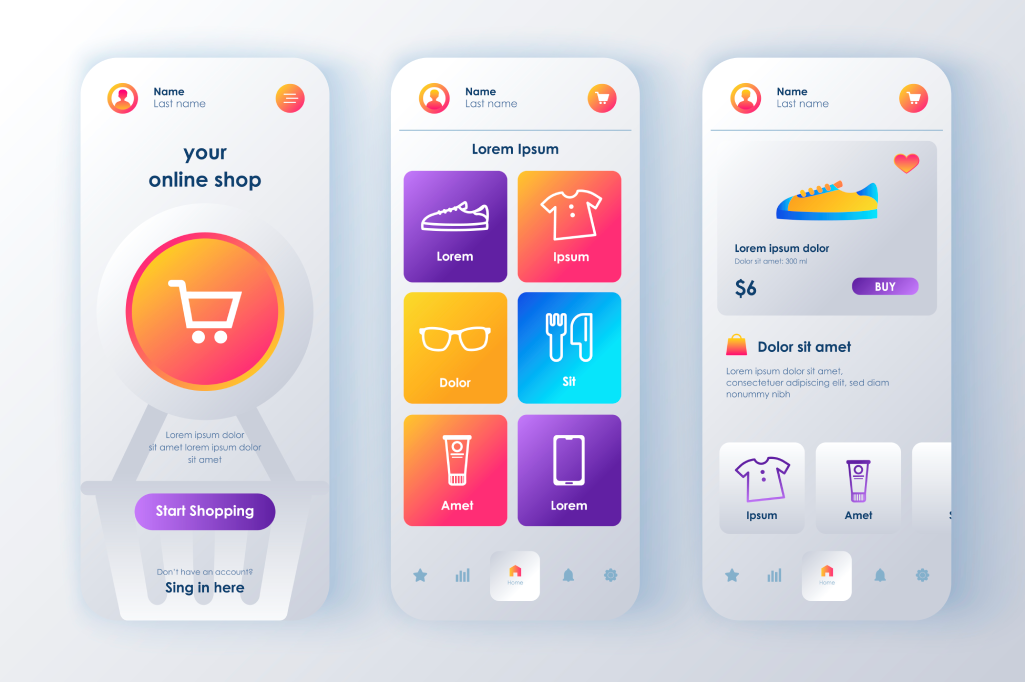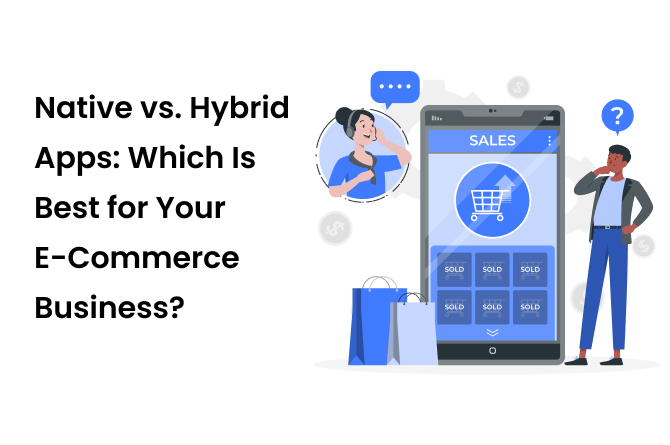Table of Contents
ToggleAs online shopping grows, more users prefer to shop via mobile apps for their convenience and a better experience. As a result, business owners are shifting towards mobile applications to increase customer engagement and improve user experience.
However, when developing an e-commerce mobile app, one common question arises—should you choose a native or hybrid app?
This decision is important because it directly impacts user experience, mobile app performance, and overall online sales.
But which option is best for your e-commerce business?
In this blog, we will provide you with a detailed comparison of native vs hybrid app development for e-commerce, analyzing key factors such as performance, mobile app design, user experience, and cost-effectiveness.
So you will have a clear understanding of which mobile app type is the right choice for your e-commerce business and how to build a high-performing mobile shopping app.
Understanding Native and Hybrid Apps
What is a Native App?
A native app is a mobile application built specifically for a single platform—either iOS (Swift, Objective-C) or Android (Kotlin, Java).
Since these mobile apps are developed using platform-specific technologies, they provide high mobile app performance, smooth navigation, and easy integration with device features like GPS, camera, and push notifications.
Native apps follow platform-specific design guidelines, ensuring a better user experience and a visually appealing interface. Businesses looking for fast, secure, and feature-rich applications often prefer native app development.
Advantages of Native Apps for E-Commerce Platforms
Below are the following advantages of native apps as follows:
1. Optimized Performance: Native apps are built for a specific platform, making them faster and more responsive than hybrid apps.
2. Enhanced Security: Native apps have access to built-in security features, protecting sensitive user data, including payment transactions.
3. Better UI/UX: These native apps follow platform-specific guidelines, resulting in a more intuitive and visually appealing experience.
4. Better Access to Device Features: Features such as push notifications, GPS, camera, AR/VR, and biometrics integrate smoothly with native apps.
5. Greater Stability and Reliability: Native apps work without performance lags or crashes, ensuring a stable shopping experience.
The advantages of native apps for e-commerce platforms make them an excellent choice for businesses prioritizing speed, user experience, and security.
What is a Hybrid App?
A hybrid app is a mobile application that combines elements of both native and web technologies. It is developed using web languages like HTML, CSS, and JavaScript and then wrapped in a native container to function across multiple platforms (iOS and Android) using a single codebase.
Hybrid apps depend on frameworks such as React Native, Flutter, or Ionic, making them cost-effective and faster to develop compared to native apps.
However, since they run within a web view, their performance and mobile app responsiveness may not match that of native apps.
Despite some limitations, hybrid apps are a great choice for startups and businesses looking for a quick and budget-friendly mobile solution.

Hybrid Apps for E-Commerce: Pros and Cons
Let’s understand the pros and cons of Hybrid apps for E-commerce are as follows:
| Pros | Cons |
| Faster & More Cost-Effective Development – One codebase for both iOS & Android reduces time and cost. | Slower Performance – Hybrid apps depend on a web view, making them less responsive. |
| Easier Maintenance – Updates are implemented across both platforms at once. | Limited Access to Native Features – Some advanced features like AR/VR and complex animations may not work smoothly. |
| Good for MVPs & Startups – Hybrid apps allow businesses to launch quickly and test market viability. | UI/UX Limitations – Hybrid apps may not provide a truly native look and fee |
Need a top mobile app developer but not sure where to start? Check out our blog, “A Complete Guide to Hiring the Best Mobile App Developer,” and make an informed decision!
Native vs. Hybrid App Features for Online Shopping
A successful e-commerce mobile app should provide fast speed performance, smooth navigation, and secure payment processing.
Below we compare native vs hybrid app features for online shopping:
| Feature | Native App | Hybrid App |
| Performance | Fast, optimized for the platform | Moderate, dependent on web technologies |
| UI/UX | Smooth, highly mobile-friendly responsive, and visually appealing | May lack smoothness and a native feel |
| Payment Gateway Integration | Secure, supports multiple options | Possible limitations based on the framework |
| Push Notifications | Highly reliable and instant | May require third-party services |
| Offline Access | Works efficiently with local storage | Limited offline capabilities |
| Security | Robust platform-specific security features | Weaker security due to web-based architecture |
For an e-commerce business that prioritizes performance, security, and UI/UX, native apps are the better option.
However, hybrid apps work well for businesses looking for cost-effective app solutions for e-commerce businesses.
Performance Comparison: Native vs. Hybrid Apps
When building an e-commerce mobile app, performance plays an important role in user engagement, retention, and overall shopping experience.
A slow or unstable app can lead to cart abandonment and lower conversion rates.
Below is a detailed comparison of native vs hybrid app performance based on key factors:
1. Speed and Responsiveness
- Native Apps: Built using platform-optimized code, native apps offer faster processing speeds and smoother user interactions.
Since they communicate directly with the device’s hardware and software, they provide quick response times without lag. - Hybrid Apps: Hybrid apps depend on a web view to render content, which can lead to slower performance and occasional lags.They may not be as responsive as native apps, especially when handling complex animations or large amounts of data.
2. Load Times and App Stability
- Native Apps: Native apps ensure fast load times and consistent performance, as they are optimized for their respective platforms.
They experience fewer crashes and better stability, making them reliable for e-commerce businesses handling high traffic. - Hybrid Apps: Hybrid apps may have longer load times due to their reliance on web technologies.
They are also more dependent on instability, especially when processing high-resolution images, product catalogs, or real-time inventory updates.
3. Compatibility with Advanced E-Commerce Features
- Native Apps: Native apps smoothly integrate with advanced e-commerce functionalities such as AI-powered recommendations, AR shopping, real-time inventory tracking, and biometric authentication.
They can use device-specific features for a superior shopping experience.
- Hybrid Apps: While hybrid apps can support some advanced features, they may struggle with complex functionalities like augmented reality (AR) or artificial intelligence (AI).
Their dependency on third-party frameworks may result in performance limitations.
If mobile app speed, stability, advanced features, and security are your priorities, native apps are the better choice for your e-commerce business.
However, if you need a quick, budget-friendly solution and can compromise on performance, a hybrid app might be sufficient.
Mobile apps are getting smarter with AI! Discover how in “Ways AI Innovation is Shaping the Future of the Mobile App Market.

User Experience in E-commerce Mobile Apps
For every e-commerce mobile app success depends on User experience (UX). A well-designed mobile app should be intuitive, visually appealing, and responsive, ensuring customers can browse, add items to their cart, and complete purchases seamlessly.
The mobile app type you choose—native or hybrid—significantly impacts user engagement, retention, and conversion rates.
Here’s a comparison of how native vs hybrid apps influence the overall shopping experience:
1. Role of UI/UX in Customer Retention
- Native Apps: Native apps offer a highly responsive and optimized UI/UX, ensuring smooth transitions, fast navigation, and high-quality animations.
Since they follow platform-specific design guidelines (Material Design for Android, Human Interface Guidelines for iOS), they feel more natural and user-friendly, which increases customer retention. - Hybrid Apps: While hybrid apps provide a consistent UI across platforms, they often lack the responsiveness of native apps.
Web-based components may lead to slower interactions and laggy animations, which can frustrate users and reduce engagement.
2. Navigation, Animations, and Overall Look and Feel
- Native Apps: Native apps deliver fluid navigation, fast transitions, and visually rich animations that increase the shopping experience.
They feel more natural because they are built specifically for the platform, making interactions more smooth.
- Hybrid Apps: Hybrid apps, due to their dependency on web views, might lack fluidity in navigation.
Complex animations may not render smoothly, and interactions can feel delayed, making the mobile app experience less engaging for users.
3. Impact on Conversion Rates and Customer Engagement
- Native Apps: Since native apps offer faster load times, better UI, and smooth navigation, they create a frictionless shopping experience, leading to higher conversion rates.
Users are more likely to complete purchases when the mobile app is fast, reliable, and visually engaging. - Hybrid Apps: Hybrid apps may experience delays in loading product pages, slow checkout processes, or laggy interactions, which can cause cart abandonment and lower conversion rates.
Customers prefer mobile apps that load instantly and offer a smooth shopping journey.
How to Choose Between Native and Hybrid Apps for E-Commerce
1. Business Goals and Target Audience Considerations
If your target audience values high performance and security, you must go for native apps.
However, If you want a quick and budget-friendly launch, hybrid apps are a viable option for your ecommerce mobile app.
2. Development timeline and budget factors
When choosing between native and hybrid apps, it’s important to consider how long the mobile app development process will take and how it aligns with your budget.
- Development Timeline:
| Factor | Native App | Hybrid App |
| Development Time | 4-12 months | 2-6 months |
| Initial Investment | Higher | Lower |
| Testing & Optimization | More complex (per platform) | Easier (single codebase) |
Native apps take longer to develop due to separate coding requirements for iOS and Android.
Hybrid apps, with a single codebase, speed up mobile app development and reduce costs.
Budget Considerations
1. Short-Term Budget: If you need a quick, low-cost solution, hybrid apps are ideal.
2. Long-Term Budget: If you plan for growth, native apps provide a better ROI.
3. Scalability and Future-Proofing Your App
- Native apps provide better scalability and long-term stability.
- Hybrid apps may struggle to handle high-traffic volumes efficiently.
For businesses with long-term growth plans, native apps offer better scalability and future-proofing.

Cost-effective app Solutions for E-Commerce Businesses
1. Development cost comparison: Native vs. Hybrid
| Cost Factor | Native App | Hybrid App |
| Initial Development | $30,000 – $100,000 | $10,000 – $50,000 |
| Maintenance & Updates | Higher (separate for iOS & Android) | Lower (single codebase) |
| UI/UX Customization | High | Moderate |
| Third-Party Dependencies | Fewer | More |
| Long-Term Scalability | High | Limited |
2. Long-term maintenance and scalability considerations
Although native apps require a higher investment, they offer better security, performance, and user satisfaction.
Hybrid apps are cost-effective initially but may require additional maintenance as technology evolves.
3. Which Option Is Budget-Friendly for Startups and Enterprises?
- Startups with limited budgets: Hybrid apps are a good starting point.
- Growing businesses & enterprises: Native apps provide better long-term returns.
For those looking for cost-effective app solutions for e-commerce businesses, hybrid apps offer a lower upfront investment, while native apps deliver higher ROI in the long run.
If you are confused about choosing the right mobile app development company? Read our blog, “How to Pick the Best Mobile App Development Company,” and find the perfect fit for your business
Conclusion
Choosing between native vs hybrid app development for e-commerce depends on your business goals, budget, and long-term vision.
- Native apps provide superior performance, smooth UI/UX, and advanced features, making them ideal for established brands.
- Hybrid apps offer faster development and lower costs, making them a practical choice for startups and MVPs
If you aim to provide the best mobile app development for online stores, investing in a native app is often the best decision. However, if you need a quick and budget-friendly solution, hybrid apps for e-commerce can be a great alternative.
Regardless of your choice, ensuring a smooth, secure, and engaging shopping experience will be key to boosting customer satisfaction and sales.
If you are still confused about the best e-commerce mobile app solution for your business, our AlphaKlick team of experts is here to help!
With extensive experience in native and hybrid mobile app development, we have worked on several successful e-commerce applications based on different client needs and business models.
Contact us today with our AlphaKlick experts to get personalized advice on your mobile app strategy!





















